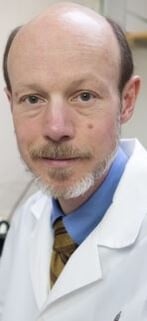Stem cell research has been used to grow tumors at the University of Illinois and grow leukemia cells at the University of Wisconsin. Another study from the University of Wisconsin, Madison shows that we can make a special kind of stem cell known as the master heart cell using the most common of mammalian cells.
 One may question why researchers would be interested in making a more specific kind of stem cell; after all, isn’t the advantage of stem cells their ability to develop into any kind of tissue? Well, yes, but according to Madison cardiologist Timothy J. Kamp (pictured left, courtesy University of Wisconsin), it is also a very dangerous disadvantage. Using all-purpose stem cells can lead to a teratoma, which is a tumor formed when some or all of the stem cells are too indecisive about what they want to become.
One may question why researchers would be interested in making a more specific kind of stem cell; after all, isn’t the advantage of stem cells their ability to develop into any kind of tissue? Well, yes, but according to Madison cardiologist Timothy J. Kamp (pictured left, courtesy University of Wisconsin), it is also a very dangerous disadvantage. Using all-purpose stem cells can lead to a teratoma, which is a tumor formed when some or all of the stem cells are too indecisive about what they want to become.
Cardiac progenitor cells, also known as master heart cells, are stem cells that have a natural tendency to form heart tissue. “With cardiac progenitor cells, you can reduce the risk of tumor formation as they are more committed to the heart lineages and are unlikely to form a tumor,” says Dr. Kamp in a new U-W release.
The main feat of Kamp’s study is the discovery that master heart cells can be produced from an extremely common type of cell known as the fibroblast. Fibroblasts are found in connective tissue like skin, which needs to regenerate more frequently than most other cells. The team managed to turn these cells into cardiac progenitors while retaining their multiplicative properties.
“Because the reprogrammed cells are actively dividing, we can generate billions of cells with relative ease,” says Kamp excitedly. Though his tests were performed on mice, he is confident that this study foreshadows a scalable method for making an almost unlimited supply of heart cells. This, he predicts, will prompt impressive advances in heart disease treatment as well as provide ample models to test drugs and other treatments.
Dr. Kamp’s study was funded by the National Heart, Lung and Blood Institute’s Progenitor Cell Biology Consortium, part of the National Institutes of Health, and the American Heart Association. For further reading regarding funding for the University of Wisconsin, Madison and its studies, click on the button below to request one of our funding reports.
Biotechnology Calendar, Inc. visits the University of Wisconsin campus for two of our BioResearch Product Faire™ events each year. We hold our Madison BioResearch Product Faire™ each year; coming up we'll have our 17th annual Madison BioResearch Product Faire™ on September 9th, 2016. For more information about this event, please follow its link. Biotechnology Calendar is a full service event company that has produced on-campus, life science research trade shows nationwide for the past 20 years. We plan and promote each event to bring the best products and services to the finest research campuses across the country. If you’re interested in attending a show closer to home, please look at our 2016 schedule of events to find a nationwide selection.


